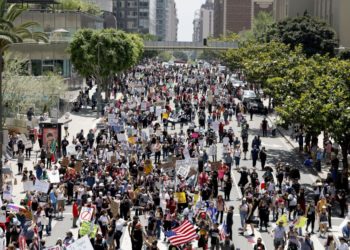In the capital of Malaysia this week, the United States and China are engaged in a contest for influence and loyalty in Asia against a backdrop of global trade turbulence.
Secretary of State Marco Rubio has been pressing top diplomats gathered at a conference in the city, Kuala Lumpur, to align with Washington’s efforts to restrict trade with China and to agree to tariff terms favorable to the United States.
At the same gathering, China’s top foreign policy official, Wang Yi, has been urging those governments to resist U.S. pressure and to embrace Beijing as the more reliable partner.
On Friday, the second day of the conference, Mr. Rubio met with Mr. Wang on the sidelines. Washington and Beijing have clashed over U.S. restrictions on advanced semiconductor chips and other exports to China, over American military aid to Taiwan, and over China’s limits on exports of critical minerals and control of some important supply chains.
“We acknowledged there are some issues that we have to work through, not just trade, but others,” Mr. Rubio told reporters traveling with him.
But overall, he said, the session with Mr. Wang “was a very constructive and positive meeting and gave us a lot to work on.” He said the two saw an “opportunity here to achieve some strategic stability and identify areas where we can cooperate together on and build better communications and working trust.”
When pressed on those potential areas of cooperation, Mr. Rubio demurred, saying they would save any public announcements for later.
As a U.S. senator from Florida, Mr. Rubio was an outspoken critic of China on many issues, including Beijing’s military ambitions and human rights record. But he has toned down his public criticism to align himself with President Trump. The American president criticizes China on trade, but often praises Xi Jinping, China’s leader, and aims to strike a grand bargain with him.
Mr. Rubio said on Friday that Mr. Trump “has a very positive working relationship” with Mr. Xi, despite China’s firm stand against the U.S. president’s efforts to significantly raise tariffs on Chinese exports to the United States, which are paid by American companies. Mr. Rubio added that “the odds are high” that Mr. Trump and Mr. Xi would meet this year.
An official Chinese summary of the meeting also stated that the two sides had a “positive, pragmatic and constructive” session and agreed to strengthen diplomacy and explore expanding areas of cooperation.
Mr. Rubio met with officials from Japan and Korea on Friday morning as he worked to shore up Washington’s ties with its allies. And he met with top diplomats from Southeast Asia in the afternoon, including in a group forum that was also attended by Mr. Wang and by Sergey V. Lavrov, the foreign minister of Russia.
Mr. Rubio’s efforts have been overshadowed by new tariff threats that President Trump made to 14 foreign leaders, which have infuriated the target governments, including Malaysia, the host of the meeting. Diplomats from seven other nations targeted by the move are also at the meeting. The tariff threats are aimed even at treaty allies, including Japan and South Korea, raising further doubts about U.S. commitments to its partners.
Many of the countries trade more with China than with the United States, so Mr. Trump’s pressure campaign could push them closer to Beijing. And many officials from the nations targeted by Mr. Trump had been negotiating trade deals with the Americans in earnest for months, so they might be wondering what the point is of serious talks if the American president continues threatening them.
Mr. Rubio defended Mr. Trump’s tariffs, saying that decades-old trade imbalances were unfair to American workers and industry. And he said that he did not see Mr. Trump’s policies as inadvertently bolstering China’s commercial ties with other nations.
“Look, I think countries are going to trade with multiple countries,” he said. “We don’t view this as an opening for anyone.”
“We view it as an opportunity to reset global trade in a way that’s fair for Americans after two or three decades of unfairness,” he added.
Mr. Wang, for his part, has used his diplomatic sessions with Asian nations to cast China as a defender of the interests of developing countries that have been hit by Mr. Trump’s trade policies.
In a meeting on Friday with a Bangladeshi official, Mr. Wang said it was both “unreasonable and unethical” for the United States to impose 35 percent tariffs on one of the “least-developed countries in the world.” China by contrast, he said, imposes no tariffs on Bangladeshi goods. (China exports about $18 billion of goods to Bangladesh annually while importing only about $1 billion.)
“China has always been the most reliable stabilizing force in a turbulent world and the most reliable partner” for Southeast Asian countries, Mr. Wang had said a day earlier as he met with the region’s diplomats.
China has been trying to court Southeast Asia to build a bulwark against Mr. Trump’s trade policies. Mr. Xi toured Malaysia, Vietnam and Cambodia in April to shore up ties in countries where companies have served as intermediary exporters for Chinese goods.
Beijing has warned countries under pressure from Washington to strike trade deals that they would face consequences if they worked with the Trump administration to restrict Chinese exports. One country that is being cajoled by the United States is Vietnam, which is among the neighboring countries that China has used as an intermediary to circumvent American tariffs on its goods.
Mr. Wang, meeting on Thursday with his Vietnamese counterpart, Bui Thanh Son, said that China opposed “economic and trade bullying” and “tariff coercion.”
Mr. Rubio met Mr. Son on Friday. Trade came up but was not a focus of the conversation, Mr. Rubio said afterward, also noting that their meeting took place on the 30th anniversary of the re-establishment of U.S.-Vietnamese diplomatic ties.
Across Republican and Democratic administrations, the United States has struggled to show Asian nations that it has a strategic vision and is committed to counterbalancing China. At the same time, most nations in Asia and elsewhere do not want the United States or China to push them to align with one superpower or another.
Some countries in the region fear the Trump administration could end several military initiatives that the Biden administration pushed.
The Pentagon is reviewing a deal, called AUKUS, that President Joseph R. Biden Jr. reached in 2021 with the leaders of Australia and Britain to provide nuclear-powered submarines and related technology to Australia. Some Pentagon officials have expressed skepticism about sending advanced U.S. weapon systems to allies.
Asked about the Pentagon’s action, Mr. Rubio told reporters the review was a normal process for a new administration, and that “our policies on AUKUS have not changed.”
Zunaira Saieed contributed reporting from Kuala Lumpur, Malaysia.
Edward Wong reports on global affairs, U.S. foreign policy and the State Department for The Times.
David Pierson covers Chinese foreign policy and China’s economic and cultural engagement with the world. He has been a journalist for more than two decades.
The post Rubio and China’s Top Envoy Vie for Influence in Asia Over Trump’s Tariffs appeared first on New York Times.




